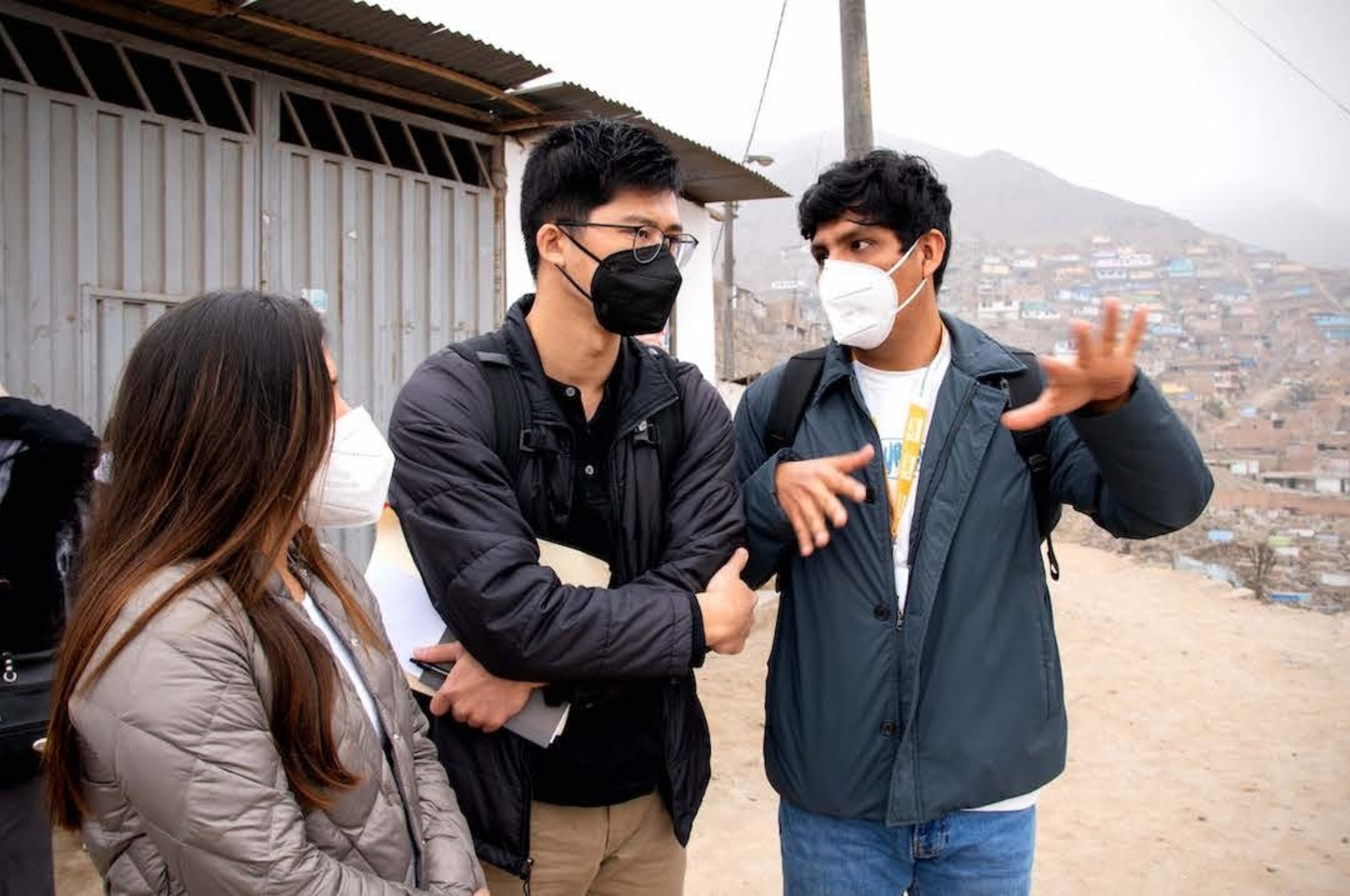Tuberculosis is a top killer in infectious diseases worldwide — but it’s preventable and treatable for those with access. International research efforts are shedding light on how community-focused solutions can hold the cure.

Alexander Chu, center, talks with research collaborators in Lima, Peru. Image courtesy of Socios En Salud.
Tuberculosis is the single leading cause of mortality by an infectious disease globally. It’s treatable for those with access to care — but only a third of the 10.6 million people who contracted the disease in 2021 were able to seek treatment.
“In many countries with a high burden of tuberculosis, there are many severe system-level inequities that contribute to delays in accessing timely care and treatment,” says Alexander Chu, fourth-year Dell Med student. “These inequities worsened during the COVID-19 pandemic and exacerbated the spread of tuberculosis in many parts of the world.”
Undertaking a research distinction for his third year at Dell Med, dubbed the “Growth Year,” Chu took part in an international study on the outskirts of Lima, Peru, that assessed the impact of providing comprehensive mental health care on depression and multidrug-resistant tuberculosis treatment outcomes.
The team found that nearly half of those starting treatment for multidrug-resistant tuberculosis exhibited depressive symptoms — and that providing a combination of mental health and social service programs not only improved depressive symptoms but also correlated with better treatment outcomes. Programs included psychoeducation, mutual support groups, occupational therapy and urgent referrals for higher-level mental health care.
“This study highlights the sheer burden of comorbid mental health conditions like depression in patients with multidrug-resistant tuberculosis,” says Chu. “Providing a comprehensive mental health care package can significantly improve both depression and tuberculosis treatment outcomes in the long run. Our findings call to attention the importance of broadening the care of patients with tuberculosis to include the integrated treatment of other physical and mental health conditions.”
Since 2017, Chu has been mentored by Megan Murray, Sc.D., M.D., an infectious disease epidemiologist and director of research, global health and social medicine at Harvard Medical School. Murray has led large-scale epidemiologic studies with partners at the nonprofit organization Socios en Salud/Partners in Health in Lima.
“Tuberculosis is highly prevalent in most low and middle income countries in the world,” says Murray. “I don’t really expect it to be eradicated in my lifetime, but if we advance the field of tuberculosis research in any of these places, that work can affect how the disease is managed elsewhere.”
Tackling Tuberculosis From All Sides
Like many infectious diseases, tuberculosis spreads along the fault lines of social and health inequities. From tobacco use to poverty, a wide range of social and structural determinants impacts transmission patterns, disease progression and who receives timely diagnosis and treatment for tuberculosis.
“In Peru, tuberculosis affects the most vulnerable populations and areas with fewer resources,” says Carmen Contreras, the director of the mental health program for Socios en Salud. “The care we implement is at the community level — that is, we go to people’s homes. We believe this promotes people’s right to access health care.”
For over two decades, Socios en Salud has worked with Peru’s Ministry of Health, local community leaders and other partners to deliver care and social support to members of under-resourced communities, particularly those afflicted by tuberculosis. To date, they have treated over 10,500 people for drug-resistant tuberculosis and achieved cure rates of 83%, among the highest in the world.
Looking ahead to a career in global health, Chu notes that these community-rooted strategies — centered on patients and creating equitable, long-term partnerships with local leaders and health systems — are some of the most powerful methods for transforming and strengthening health systems and improving access to care, particularly for people with low incomes and members of marginalized populations.
“Research can and should be an important tool to not just generate evidence but also catalyze and drive social change toward reducing inequities,” Chu says. “At the heart of my research interests, I am driven by meeting individual patients, learning their stories and better understanding their communities. They all center and remind me of what we’re doing and why we’re doing this.”